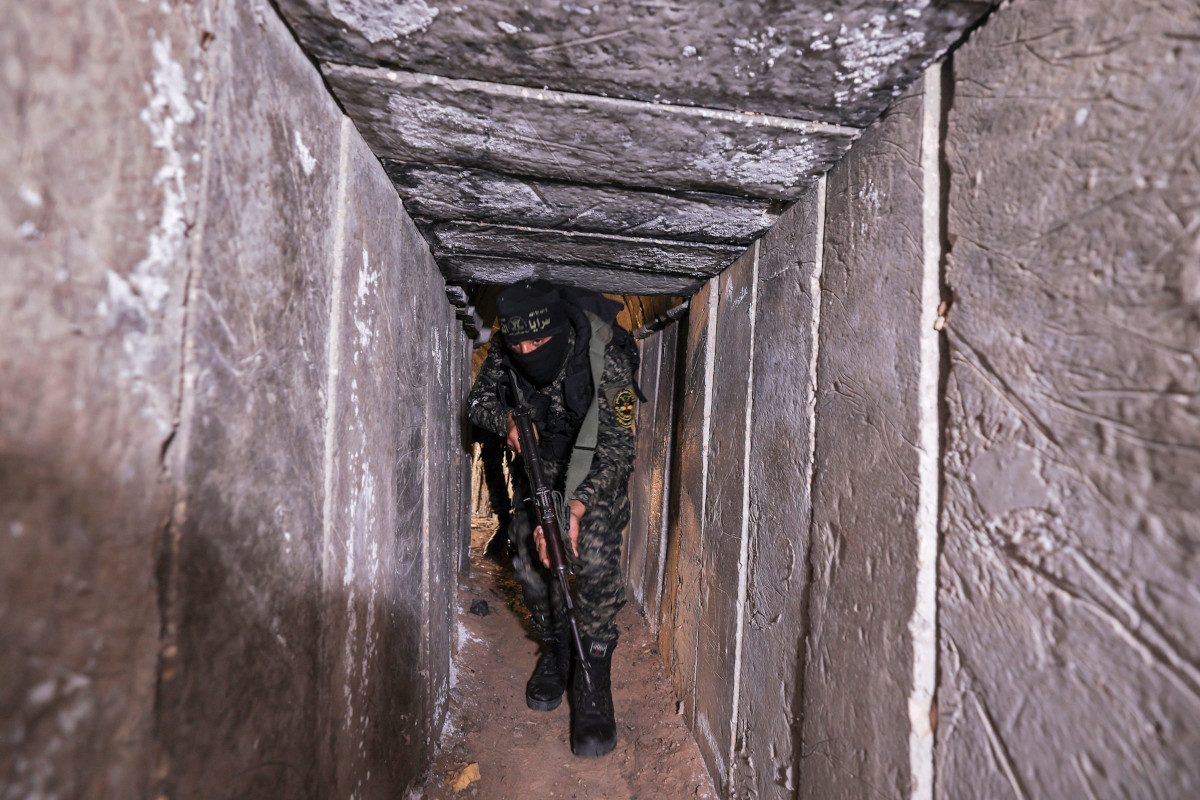Israeli forces are prepared to employ “sponge bombs” that produce quick-hardening foam to seal off tunnels used by terrorists in the Gaza Strip, according to a recent report. Though unconfirmed, there is some precedent for the use of devices that create hard or at least very sticky foam by military and other security forces.

The Telegraph newspaper in the United Kingdom published a story about the purported Israeli foam-dispensing ‘bombs’ on Wednesday. It is important to note up front that, at the time of writing, the Telegraph‘s piece does not appear to cite any sources, on the record or anonymous, and explicitly says “the IDF [Israel Defense Forces] has not commented on the use” of these devices.
As described by the Telegraph, the devices contain a binary chemical mixture that only blends together when the device is activated. The system is reportedly small and light enough to be emplaced, or even thrown, by a single individual.
Israeli “soldiers were seen deploying the devices during exercises in 2021,” according to the Telegraph, but no further details or imagery are provided. “The [Israeli] army has set up a mock tunnel system at the Tze’Elim army base near the border with Gaza.”
Tze’Elim is publicly known to host a mock Palestinian village with an underground tunnel network specifically to help prepare IDF personnel for ground operations in places like Gaza. To this point, this training site is even nicknamed “Little Gaza.”

“The ‘sponge bomb’ – technically a liquid emulsion – is hazardous to work with, and some Israeli soldiers have lost their sight through mishandling the mixture,” the Telegraph reported, again without providing any substantiating information.
Whether or not the IDF’s sponge bombs exist or not, a device like the one the Telegraph‘s report describes does not seem impossible to develop. Various grades of quick-hardening and expanding foam are in widespread use in commercial construction and might be able to provide a useful seal, at least temporarily. One U.S. manufacturer of commercial urethane foam, U.S. Composites, Inc., says that its “16LB density foam is essentially as hard as a rock” and “you would need a hammer in order to make any dents in this product.”

Construction is, of course, a very different context from military operations in tunnels, where it would also be very important for any foam to be applied as quickly as possible. Still, a more specialized mixture could conceivably be derived from existing commercial formulations that could offer something more suitable for military use.
It is also worth noting that many commercial-available chemical foams, including types not designed to harden and that are used for entertainment purposes, can cause various degrees of eye injuries. This is at least broadly in line with the mention of ‘lost sight’ in the Telegraph‘s report, which could refer to temporary or more serious losses of vision from mishandling the foam.
On top of all this, there are multiple known examples of spray foams that become extremely sticky, even glue-like, being used, or at least tested, by military and security forces, including in the United States.
The U.S. Marine Corps fielded devices designed to shoot streams of sticky foam as a non-lethal tool for immobilizing hostile individuals at least on a limited basis in the past. At least some Marine units sent to Somalia in the 1990s notably had this capability on hand. It is unclear whether or not this system is still in the Corps’ inventory.

In 2009, the U.S. Army awarded a contract for work on a similar-sounding capability to what the Marines used, which was also intended primarily to be used for non-lethal crowd control. It is unknown how far the service pursued this project. The company the Army hired to provide those systems, Adherent Technologies of Albuquerque New Mexico, claimed at the time to offer foam strong enough that it could be used to stop commercial cars and trucks in their tracks.
Dispensers full of super-sticky immobilizing foam are also known to be among the defensive features found on heavily modified tractor trailer trucks that the Department of Energy’s National Nuclear Security Administration (NNSA) uses to move nuclear weapons and other related sensitive cargoes. You can read more about these specialized trucks and their potentially James Bond-esque self-defense capabilities here.

A ‘bomb’ full of quick hardening and expanding foam could be very useful for Israeli forces in any impending ground operations in Gaza. Hamas and other terrorist groups there make use of an extensive tunnel network that has been dubbed the “Gaza Metro.”
The War Zone recently highlighted the challenges tunnels pose in a larger piece on the dangers Israeli forces would face in Gaza, writing:
“Tunnels give combatants a seemingly magical ability to pop up out of nowhere just to quickly disappear again. Just finding the tunnels themselves can be a huge challenge and destroying all of them in such a way they can’t easily be reconstituted is another major undertaking.”
…
“Subterranean combat is extremely perilous. With movements totally restricted — a fatal funnel may be around every turn — no support from the air and limited communications, unique tactics are needed not just to succeed, but to survive when fighting in such conditions. The enemy has a massive upper hand as they know the underground layout and are prepared to capitalize on every advantage that it offers.”
With all this in mind, being able to rapidly seal tunnels, even just certain portions of a specific network, would reduce the total number of vectors for potential threats to flow through and otherwise limit their utility. Enemy forces might find themselves trapped within, too. Even if the foam only offers a temporary seal, it would also still suck up enemy time and resources to reopen blocked passages.

There are other ways at Israel’s disposal to seal tunnels in Gaza, including teams on the ground emplacing explosive charges and airstrikes. However, those means present additional risks for collateral damage, including secondary explosions from weapons and ammunition inside passages detonating following an initial blast. The “sponge bomb,” at least as described, would seem to offer a more immediate and exponentially less invasive option.
Regardless, of course, it remains possible that the ‘sponge bomb’ report is false, either in part or in full. The War Zone has previously highlighted how unsupported claims about “secret” or “unusual” military capabilities can evolve organically, as well as be fabricated deliberately, in a piece discussing still curious reports in 2017 about U.S. forces using “electricity bombs” in Syria.
In this particular instance, it is perhaps interesting to note that the Telegraph‘s ‘sponge bomb’ story came out the same day as an extremely dubious and entirely unsubstantiated report from Middle East Eye claiming that the U.S. military is preparing to help Israeli forces flood Gaza’s tunnels with nerve gas. A single anonymous “senior Arab source familiar with the Palestinian groups” is cited in that story, which has already been altered in its key details at least once since publication.
With the information available now, The War Zone just cannot conclusively say whether or not Israeli forces actually have foam-dispensing ‘bombs’ to seal up tunnels. At the same time, relevant capabilities are known to exist and to have been tested and employed by military and other security forces before.
If and when a major Israeli ground incision into Gaza finally comes, harder evidence of these reported foam-spewing devices, which could be very useful in temporarily neutralizing tunnel networks, may finally emerge.
Contact the author: joe@thedrive.com
